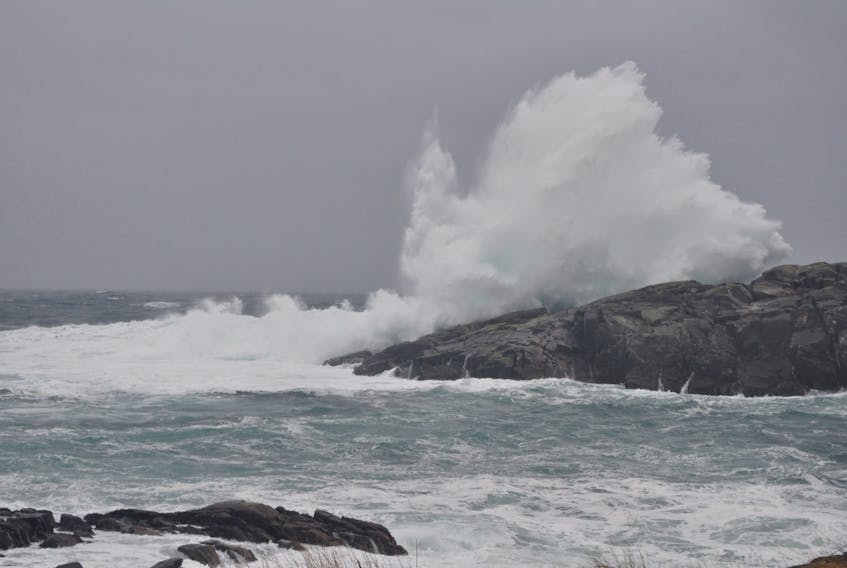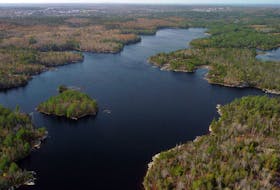From my inexpert and cursory reading of the newspapers, I understand that there is at least one positive aspect of the relentless pandemic that plagues us.
The industrial and travel disruptions have caused many regions of our planet to experience a hefty drop in air pollution and the ubiquitous lockdowns have resulted in diminished energy consumption and an encouraging reduction in carbon emissions.
Ironically, given the chance by a global calamity, it seems the environment can reveal its restorative properties. This may be an important lesson to be reminded of. If we are willing to release the pressure on nature, she bounces back. Recovery is possible.
Unexpectedly, I remember a minor version of this lesson that was impressed on me, at least in an anecdotal (micro) sense, many years ago when I spent summers on my grandfather's farm.
I suspect there are many Maritimers of my vintage (the musty side of 70) who spent all or part of their youth in rural settings that included hayfields and blackflies but may not have included electric stoves or indoor plumbing.
Many will remember these rural adventures as formative experiences — agreeable, instructive, difficult, and affirming. Most will recall them fondly.
Many of the iPhone generation are denied the deprivations provided by these early rustic expeditions. They may not have the chance to pick the burdocks off their pants or chew timothy or spruce gum, or pick rocks or thin carrots. Or run through pastures making a game of avoiding the cow pies — some fresh with flies, some crusted over.
And many don’t get to hear the perspectives of that less-complicated generation when people stayed home (without government mandate) and died there, connected to nature by necessity, the seasons, the cycles of life — where people talked about frost, rain, the full moon, and hope.
And infants were encumbered with names like Ambrose, Augustus, Gladys and Blanche. These folks fixed things; they discarded nothing. Theirs was a satisfying and difficult life, filled with nature’s consolations, rusted machinery, joy and tragedy.
But in the summer, there were sugar cookies and homemade ice cream, and children got out of bed early with mist hanging over the fields and in their eyes, and hay in their hair. The old people explained that the day should be experienced when it is still fresh. They knew morning’s glory. “Take your time and do things right,” they advised. “There is no need to finish your work too early; you just have to wait that much longer to go to bed.”
My grandmother saved stuff. She knew the proper names for the life around her. Specificity was important to her. It was never just a bird, but a grosbeak or a grackle, not a bush but a chokecherry or honeysuckle, not a tree but a red oak or a black spruce, not a weed but a sow thistle or stinging nettle, and not just hay but fescue or timothy.
She explained horseflies, deer flies, black flies, blue flies, sand flies, gnats, midges and vampire mosquitoes. She knew all about June bugs and May flowers and the Ides of March.
She knew a lot of stuff. She saved most of it.
Embedded among the various instructions that a rural experience imparts is an appreciation of the purgative powers of nature — its capacity to cleanse and restore. In my faded memory, this concept (this path) leads to my grandfather’s outhouse.
His farmhouse in early days had no indoor plumbing, but just beyond the henhouse there stood a solitary outhouse. Weathered barn boards, standing tall, a democratic outhouse built on the principles of freedom and equality, available year-round, waiting expectantly.
It had to be. It was a two-holer, one sized smaller than the other, to avoid the loss of children. The spruce boards worn to a glossy smoothness by the frictions of shifting and grunting, a ragged roll of paper, a can of lime, some poetry and mild profanity pencilled on the rough walls (“Though my love had prunes and bran to eat / Her heart is like a laundered sheet”).
Some poems were two boards long, written by Anonymous, the rural laureate.
By local standards, it was a high-end privy, vented on the gable-ends and the door hook for privacy. And like all old farm buildings, the outhouse held its mysteries — the rodent-chewed floorboards, the knothole near the back, the dated doggerel on the walls. Confined there, the solitude as well as the odour of the dusty space insured that (in addition to other releases) youthful imaginations were set free.
What evils, what creatures loitered in the darkness below the rim? There were stories. Uncommon courage was required for a child, their business done, to look down into the abyss — like Adam’s apple in the Garden, the temptation was not always avoided.
And in the winter evenings, almost dark at suppertime, children might find enough light to make their way along the path but it was pitch black when they closed the creaky door. “Darker than the inside of a cow,” my grandmother said.
The functional architecture was unusual. There was no hole in the ground to collect the excreta, but a large elongated wooden box (more like a trough) into which all discharge fell. Made from rough sawmill lumber, it had a short piece of thick chain attached to one end. In the springtime, the old horse (a white horse named Silver) was harnessed and hitched to the box and it was extracted (it slid nicely) and hauled way back to a hayfield about a mile from the house. There, it was emptied before being hauled up the south side of a nearby rockpile where it was exchanged for another clean box that had been left on the rocks from the previous year.
A full year of purging by various insects, heavy rains and direct sunlight had left the replacement box spotless. My uncle said you could eat porridge out of it. Its redemption was considered a minor miracle. Nature, left alone, had redeemed the unredeemable, given it back pure and unblemished.
(These troughs were rotated annually in a system that worked like the saw-blade exchange program at Home Hardware.)
During the coldest winter months, the outhouse was optional, especially for children. There was a chamber pot in the unheated attic above the kitchen, and beside it a crude, wooden shelf that held mouldy books with pressed leaves and silverfish. The area’s drifting odour was overpowering. It was considered an exclusion zone. “It smells like Finnegan’s goat,” Grandma said.
My weakened mind is able to set aside the serious illustrations of nature’s power to restore degraded landscapes, and recall another trivial sample. The epiphany of the poop-trough exchange program was reinforced years later during a fishing trip to St. Margaret’s Bay with my buddy John and his friend, a Newfoundlander who was an expert with a filleting knife, and called the boat anchor a “hanker.”
We’d catch a bunch of codfish and land the boat on a small island to clean and filet them. When done, we’d leave a big mess of heads, guts, bones and blood all over the rocks, and in the shallow water near the boat. It was a disgusting mess; the innards from a cluster of cod can leave a blemish.
But if we fished for an hour longer and came back to the same island, the area would be spotless. The seagulls had cleaned up every scrap on the rocks and the crabs took care of what had fallen in the water. The bleaching power of the sun had left the rocks pristine.
Nature (as mothers do) had cleaned up after us, taken care of us, and taught us a lesson about her hopeful resilience.
It wants to proclaim itself if we just take some of the pressure off.
William J. Kilfoil lives in Mineville, Nova Scotia









